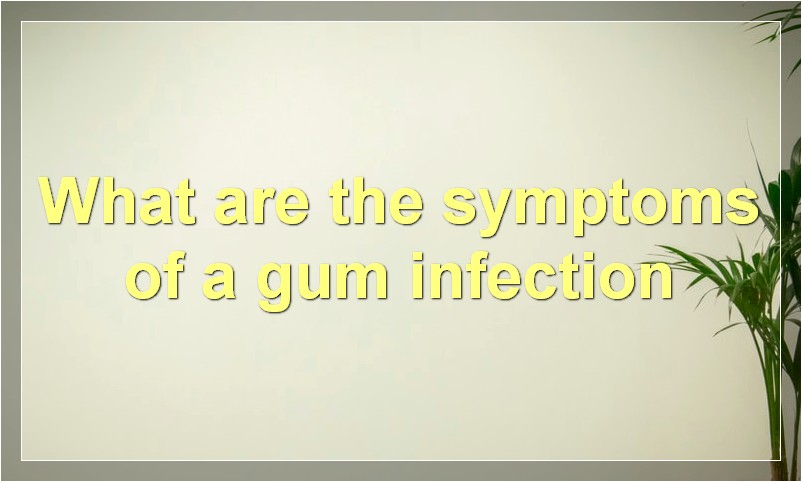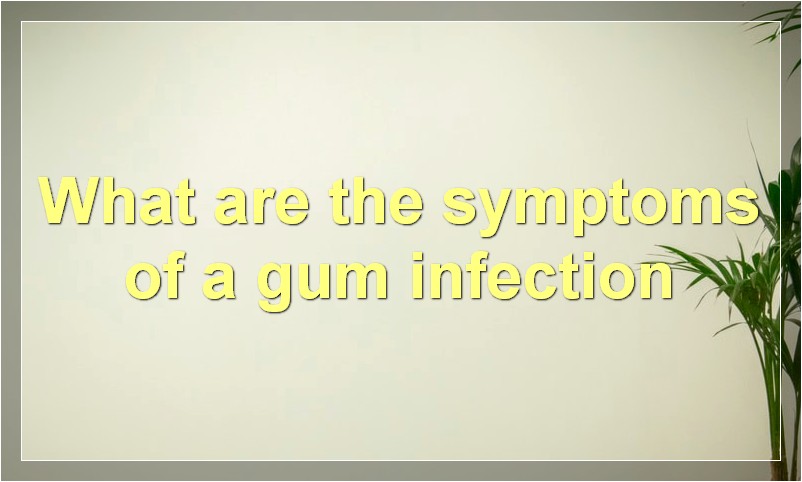A gum infection is a serious condition that can lead to tooth loss if left untreated. While antibiotics are the most common treatment for gum infections, there are times when they are not necessary. Here are some tips on how to get rid of a gum infection without using antibiotics.
1. Practice good oral hygiene. This means brushing your teeth twice a day, flossing daily, and using an antibacterial mouthwash. Doing this will help to remove the bacteria that cause gum infections.
2. Eat a healthy diet. A diet rich in vitamins, minerals, and antioxidants will help to boost your immune system and fight off infection.
3. Avoid tobacco products. Tobacco use is a major risk factor for gum infections. If you smoke or chew tobacco, quitting will help reduce your risk of developing an infection.
4. Treat underlying medical conditions. If you have diabetes or another medical condition that increases your risk of gum infections, be sure to keep it under control. This may require medication or other treatment.
5. Use home remedies. There are several home remedies that can help treat a gum infection, such as rinsing with salt water or applying a warm compress to the affected area.
6. See your dentist regularly. Regular dental checkups and cleanings can help prevent gum infections by removing plaque and tartar from your teeth.
What is a gum infection?
A gum infection, also known as periodontal disease, is a serious dental condition that occurs when the gums and bone around the teeth become inflamed and infected. If left untreated, gum disease can lead to tooth loss and other serious health problems.
What are the symptoms of a gum infection?

The symptoms of a gum infection can vary depending on the severity of the infection. However, some common symptoms include red, swollen, or tender gums; gums that bleed easily; bad breath; and a persistent foul taste in the mouth. If left untreated, a gum infection can lead to more serious problems such as tooth loss, bone loss, and even heart disease. Therefore, it is important to see a dentist at the first sign of any gum problems.
What causes a gum infection?
The primary cause of a gum infection is plaque, which is a sticky film of bacteria that constantly forms on your teeth. If not removed, plaque can turn into tartar, which is a hard deposit that can only be removed by a dental professional. Once tartar has formed, it irritates your gums and causes them to become inflamed. This inflammation is called gingivitis, and if left untreated, it can progress into periodontitis, which is a serious infection of the soft tissue and bone that support your teeth.
How can I prevent a gum infection?
There are a few things you can do to prevent gum infection. First, practice good oral hygiene by brushing and flossing your teeth regularly. This will help remove plaque and bacteria from your teeth and gums. You should also see your dentist for regular cleanings and checkups. If you have any existing dental problems, be sure to get them treated as soon as possible. Gum infections can often be caused by underlying dental issues, so it’s important to keep your mouth healthy. Finally, try to avoid smoking or using other tobacco products, as these can increase your risk of gum disease.
How do I know if I have a gum infection?
If you have gum infection, also called periodontal disease, your gums may bleed when you brush your teeth. You may also have red, swollen, and tender gums. You may have pus between your teeth and gums. And your teeth may become loose. If any of these things happen, see your dentist right away.
What are the complications of a gum infection?

A gum infection, also called periodontitis, is a serious gum disease that damages the soft tissue and bone that support your teeth. Periodontitis is usually caused by plaque, a sticky film of bacteria that constantly forms on your teeth. If not removed, plaque hardens into tartar, or calculus, which can only be removed with professional cleaning.
If plaque and tartar are not removed, they will continue to destroy the gums and bone. As the disease progresses, the gums pull away from the teeth and form spaces (called “pockets”) that become infected. The body’s immune system fights the bacteria as the pockets deepen and more gum tissue and bone are destroyed.
Symptoms of periodontitis include red, swollen, and bleeding gums; persistent bad breath; sensitive teeth; and gums that have pulled away from the teeth. If you have any of these symptoms, you should see a dentist or periodontist (a dentist who specializes in treating gum disease) as soon as possible.
Untreated periodontitis can lead to tooth loss. In fact, it is the leading cause of tooth loss in adults over the age of 35. It has also been linked to other serious health problems such as stroke, heart disease, and diabetes.
If you have periodontitis, your dentist or periodontist will work with you to create a treatment plan. The goal of treatment is to stop the progression of the disease and prevent further damage to the gums and bones. Treatment may include professional cleanings, scaling and root planing (a deep cleaning that removes plaque and tartar from below the gum line), antibiotics, and surgery.
How is a gum infection treated?
A gum infection is treated by a dentist or periodontist through a process called scaling and root planing. Scaling involves the removal of plaque and tartar from the teeth and roots. Root planing is the process of removing infected tissue and bacteria from the roots of the teeth.
Can a gum infection be prevented?
Yes, a gum infection can be prevented. There are many things you can do to keep your gums healthy and avoid gum disease.
What is the prognosis for a gum infection?
A gum infection, also called periodontitis, is a condition in which the gums become inflamed and swollen. This can lead to the formation of gaps between the teeth and gums, called pockets. These pockets become filled with bacteria, which can cause the gums to become further irritated and inflamed. If left untreated, periodontitis can eventually lead to tooth loss. The prognosis for periodontitis depends on how early the condition is caught and treated. If it is caught in its early stages, then the prognosis is good. However, if it is allowed to progress unchecked, then the prognosis becomes much more serious.
How can I get rid of a gum infection without using antibiotics?
If you have a gum infection, also called gingivitis, you may be able to clear it up without antibiotics. The first step is to practice good oral hygiene. This means brushing your teeth at least twice a day and flossing once a day. You should also see your dentist regularly for professional cleanings. If your gingivitis is severe, your dentist may recommend a special mouthwash or toothpaste. In some cases, gingivitis can progress to periodontitis. This is a more serious infection that requires treatment with antibiotics.




